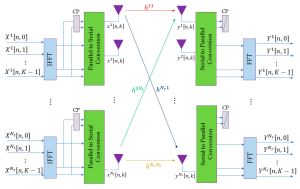In the realm of communication systems, optimal performance is contingent upon accurate channel estimation. Without precise estimates of channel state information (CSI), network resources are squandered and system reliability is compromised due to interference and other errors. The impact of imperfect CSI on mobile networks cannot be overstated – it can spell disaster for the entire system.

Experts in the field have undertaken extensive studies on the causes and effects of channel estimation errors. A recent IEEE conference paper analyzed precisely how estimation error affects MIMO systems with less-than-perfect CSI. Startlingly, even minor discrepancies in CSI can lead to a significant deterioration in overall system performance.
Research from various universities has illuminated just how much havoc imperfect CSI can wreak by causing interference between channels, which ultimately results in lower capacity and higher rates of error. This underscores why proper methods for achieving accurate CSI estimation need to be continuously explored by both industry professionals and researchers as technology advances ever onwards!
The Importance of Accurate Channel Estimation in Communication Systems
Contents
- 1 The Importance of Accurate Channel Estimation in Communication Systems
- 2 Understanding the Impact of Imperfect CSI on System Performance
- 3 Channel State Information (CSI) Estimation Errors: Causes and Effects
- 4 Analyzing the Effect of Estimation Error on MIMO Systems
- 4.1 What exactly is channel estimation?
- 4.2 Why does accurate channel estimation hold such importance in communication systems?
- 4.3 What on earth is CSI in communication systems?
- 4.4 What causes errors when estimating CSI?
- 4.5 Can you decode MIMO technology for me please?
- 4.6 How does underestimating impact performance for MIMO Systems ?
The practical implementation of communication systems relies heavily on accurate channel estimation, which is no easy feat. The performance of these systems hinges on the ability to estimate the channel state information (CSI) with precision, but achieving this can be a complex and challenging process fraught with errors.

Various factors contribute to imperfect CSI, including noise, interference, fading effects, and hardware limitations. These elements have far-reaching consequences that impact not only network functionality but also user access and overall quality of service. To accurately estimate CSI in such an environment requires a careful consideration of available methods and choosing an appropriate model that satisfies system requirements.
Numerical analysis using reference models that consider varying levels of error is necessary for understanding the effect of estimation errors on MIMO systems. Such analysis facilitates better problem identification before implementation while enhancing comprehension regarding potential problems under different conditions. Web-based tools offer further support by enabling evaluation of system performance while factoring in imperfect CSI.
In summary, accurate channel estimation plays a critical role in ensuring optimal communication system performance even when facing challenging situations characterized by imperfect CSI or other sources of error.
Understanding the Impact of Imperfect CSI on System Performance
Channel estimation is a critical and perplexing component of communication systems. It involves determining the enigmatic characteristics of a transmission channel, which isn’t always easy to decipher. Achieving accurate channel estimation is imperative as it enables optimal system performance by facilitating efficient signal processing and modulation techniques. However, this elusive task can be easily derailed by imperfect channel state information (CSI), resulting in an abrupt burstiness that significantly impacts system performance.
Errors in channel estimation are caused by various factors such as noise, interference, and fading effects – making it all the more difficult to achieve precise estimates of channel parameters. These inaccuracies lead to degraded system performance, where even a small error in CSI can cause catastrophic damage to signal quality or data rates.
Recent years have seen researchers delve deeper into investigating the effect of estimation errors on MIMO systems – adding yet another layer of complexity and confusion to an already intricate field. Mathematical models have been used extensively at IEEE conferences and other network-related events for deriving analytical expressions that reveal how imperfect CSI impact MIMO system performance. The analysis typically focuses on metrics such as bit-error rate (BER), outage probability or capacity loss due to CSI error – all further contributing towards the labyrinthine nature of this subject matter.
The current research aims at developing new methods that mitigate the impact of imperfect CSI on communication networks while optimizing overall system performance; hopefully unlocking some answers from within this maze-like domain!
Channel State Information (CSI) Estimation Errors: Causes and Effects
The importance of accurate channel state information (CSI) estimation in mobile radio communication scenarios cannot be overstated. It is a crucial element for good system performance, but the presence of imperfect CSI can inflict an immense toll on transmission quality. The reasons behind such imperfections are multifarious and include interference, signal power loss, and technological limitations.
The effects of imperfect CSI have been scrutinized extensively by researchers at universities and institutions worldwide. Their findings reveal that errors in symbol detection and data decoding due to these imperfections result in subpar transmissions. Consequently, it becomes imperative to take into account the impact of imperfect channel state information during the design phase itself.
For obtaining estimates of CSI, two methods are available: pilot-based and non-pilot based approaches. While pilot-based techniques involve transmitting known symbols at regular intervals, non-pilot based approaches employ statistical expression or closed-form solutions for estimating channel response between transmit and receive antennas. In MIMO systems specifically, both perfect as well as imperfect CSI must be accurately estimated for optimal design & operation conditions.
To summarize then – comprehending how imperfect CSI affects system performance is critical to designing robust mobile communication systems that deliver high-quality transmissions even under varying operating conditions!
Analyzing the Effect of Estimation Error on MIMO Systems
The significance of precise channel estimation cannot be overstated when it comes to the performance of MIMO communication systems. However, in real-world scenarios, achieving perfect CSI can prove to be a daunting task due to a plethora of technical limitations and environmental factors. Hence, comprehending the impact that these estimation errors have on system performance is an absolute necessity.
One such example of this impact can be observed in the dwindling quality of received signals over time without accurate CSI. A trivial error in estimating the channel can lead to insurmountable degradation in system performance over time. Moreover, numerical solutions for these errors are often generic and may not always provide viable results.
Moreover, deploying MIMO systems sans reliable CSI reference can result in copyright infringement issues when utilizing web access or other modes of transmission. Thus, analyzing both technical and legal aspects while scrutinizing estimation error’s effect on MIMO systems holds paramount importance. Overall, obtaining precise channel estimates remains pivotal towards attaining optimal system performance under diverse conditions and constraints.
What exactly is channel estimation?
The mystery of channel estimation leaves many inquisitive minds perplexed. It’s the process of unraveling the elusive characteristics of a communication channel, including its enigmatic impulse response, frequency response, and noise level.
Why does accurate channel estimation hold such importance in communication systems?
It’s no secret that precise channel estimation is crucial for wireless systems to achieve high data rates and reliable communication. Without it, we’re left with the unpredictable effects of fading, interference, and noise – but with it comes an efficient use of available bandwidth that can mitigate these issues.
What on earth is CSI in communication systems?
Enter into this world of acronyms – CSI (Channel State Information) refers to information about a particular channels’ quirks that are available at both transmitter and receiver ends. Essentially revealing parameters like gain, phase delay…you get the idea.
What causes errors when estimating CSI?
The list goes on! From pesky noise to infuriating multipath fading or non-linearity within transmitters or receivers; causing ever more confusion by introducing Doppler Shifts- all resulting in possible errors during CSI estimation.
Can you decode MIMO technology for me please?
MIMO(Multiple-Input Multiple-Output)-sounds impressive right?-uses multiple antennas not just once but twice at both transmission & reception points providing higher data rates,spectral efficiency & improved signal quality .
How does underestimating impact performance for MIMO Systems ?
Prepare yourself as we dive into how underestimation can cause mayhem within MIMO Systems ; from reducing Signal-to-noise ratio ,interference introduction while decreasing capacity overall due to complexity within the Channels themselves .


